Pence Endorses The Really Bad Idea Of Bringing Georgia Into NATO
Vice-President Pence is advocating the admission of Georgia into NATO. That would be a bad idea.
Speaking yesterday during a visit to Tibisi, Vice-President Pence endorsed the idea of bringing the nation of Georgia into the NATO alliance:
U.S. Vice President Mike Pence pledged support Tuesday for the former Soviet republic of Georgia, his second stop on a European trip backing nations that feel threatened by Russian aggression.
Russia and Georgia fought a brief war in 2008, which lead to two breakaway Georgian regions, South Ossetia and Abkhazia, declaring independence. Russia has since been supporting the regions both financially and militarily.
The U.S. “strongly condemns Russia’s occupation on Georgian soil,” Pence said Tuesday at a joint news conference with the Georgian prime minister in Tbilisi, the Georgian capital. “We will reject any claim at any time by any nation that undermines this enduring principle.”
The visit comes a day after Pence met with the presidents of three NATO countries — Estonia, Latvia and Lithuania — in the Estonian capital of Tallinn and pledged that “an attack on one of us is an attack on us all.”
The visit comes a day after Pence met with the presidents of three NATO countries — Estonia, Latvia and Lithuania — in the Estonian capital of Tallinn and pledged that “an attack on one of us is an attack on us all.”
Georgia and the three Baltic nations were all occupied for nearly five decades by Soviet troops before regaining their independence in 1991 after the collapse of the Soviet Union.
Later on Tuesday Pence will inspect troops taking part in joint U.S.-Georgian military exercises.
The idea of admitting Georgia, a nation that lies in the Caucus Mountains region and shares borders with Turkey, Armenia, Azerbaijan and, along its longest frontier, Russia, to NATO is one that has been around for quite some time. Shortly after the nation gained independence from the former Soviet Union, it joined both the NATO-run North Atlantic Cooperation Council and the Partnership for Peace, two organizations that included many of the former Warsaw Pact nations as well as nations that had once been part of the Soviet Union. Later in the 1990s, the nation entered a formal Status of Forces Agreement with NATO and established formal diplomatic relations with the Alliance. Joint military exercises began in 2001 and 2002 and, after the Rose Revolution in 2003 that overthrew the government of former Soviet Foreign Minister Eduard Shevardnadze, the nation cooperated with NATO efforts in Afghanistan in response to the September 11th attacks. In 2005, the nation began the process of seeking to become a full member of NATO, an effort that culminated in 2008 with a non-binding referendum in 2008 in which 77% of those who came to the polls voted in favor of seeking membership in the NATO alliance. Despite these entreaties, NATO members have been reluctant to endorse the idea of Georgian membership, and the application process appears to be stalled at this point in time. (Source)
It wasn’t very long after that referendum that Georgia and Russia got into a confrontation that was rooted in bids for independence from South Ossetia and Abkhazia, two regions of Georgia that have historically close ties to Russia. Both regions sought to return to Russian control and resisted efforts from the rest of the nation to develop closer ties to NATO and the European Union. The Russians invaded Georgia in August 2008 and quickly overran the vastly inferior Georgian military, inflicting serious casualties on military and civilians alike in the process. By the time the war was over, Russia had its forces in South Ossetia and Abkhazia firmly entrenched, and those regions remain occupied by Russian troops to this date. (Source) The invasion occurred in the context of the beginning of the 2008 Presidential campaign and led to many Republicans calling on the United States and NATO to respond to the Russian attack. The most absurd of these came from Republican nominee John McCain who proclaimed at one point “We are all Georgians,” a comment that prompted a vigorous response from many quarters who disagreed with the idea that a crisis on Russia’s border and a dispute that had bad actors on both sides should lead to the United States taking sides at all. In the nine years that have followed the war, there’s been no real progress on the idea of Georgia joining NATO. Each time the issue has come up, the alliance has blocked the idea and the consensus at this point seems to be that NATO membership for the nation is something that is off the table for the time being, especially with the extent to which Russia has become more aggressive about defending its borders. Now, the Vice-President of the United States appears to be indicating that the Trump Administration wishes to reopen this can of worms.
The people in the West advocating membership in NATO for Georgia appear to be largely the same group of people who are also advocating NATO membership for Ukraine, specifically including what remains of the neoconservatives that once had a home in the Administration of President George W. Bush. As with Ukraine, their primary motivation seems to be the idea that admitting Georgia as a NATO member would be a rebuke to Russia in general and to Russian President Vladimir Putin in particular, who has long been riling up the Russian masses with talk about ‘escalation’ by NATO as the alliance expanded to included all of the former members of former Warsaw Pact except Russia, and most especially the Baltic states of Latvia, Lithuania, and Estonia, the only NATO members that used to be part of the U.S.S.R. itself. Playing mostly on old Russian fears of being encircled by its adversaries, Putin has portrayed NATO’s expansion as a threat to Russia’s territorial integrity and an assault on areas that have traditionally been considered within Russia’s sphere of influence. As with the recent admission of Montenegro into the alliance, though, these advocates have been rather unclear about what benefit bringing Georgia (or Ukraine for that matter) into the alliance would bring for its other members. At the very least, it seems to me that the advocates for membership should have to meet this burden before any discussion about membership should be allowed to advance.
On paper at least, it doesn’t seem to me that Georgia’s admission would add anything to the alliance that it doesn’t already have. At roughly 3.7 million people, Georgia’s population would make it one of the smallest members of NATO, and its relatively small amount of military personnel, standing around 37,000 (source), means that its ability to actually contribute to NATO in a meaningful way would be extremely limited at best. In the meantime, admitting the nation would mean that every other member would be bound to come to its defense should the war over South Ossetia and Abkhazia, or any other conflict, flare up again in the future. Given its location, getting resources to Georgia in the event of such a crisis in the middle of a crisis would be difficult at best, and could prove futile given the ease with which another Russian invasion would have in overrunning the country as it did in 2008. To be completely frank about it, it’s questionable at best whether some of the members of NATO would be willing to send their forces to die to such a remote location for a nation that has a tenuous connection at best to NATO’s primary mission of securing peace in Europe and the North Atlantic. Indeed, there are some who debate whether or not Georgia should even be considered part of Europe. Finally, admission of Georgia would inevitably lead to questions about the admission of other nations in the region such as Armenia and Azerbaijan, which have had their own territorial disputes with Russia and other neighboring nations. While both those nations have resisted the idea of NATO membership in the past, expansion of the alliance could lead to a change in opinion and increased pressure on the alliance to expand even further East and to make it seem as though Russian fears about being encircled are coming true.
Taking all of this into account, Georgian membership seems to be as foolish an idea as it was in 2008. Such a move would not add anything to NATO itself and risks needlessly provoking Russia in a region that has traditionally been a part of its sphere of influence. Pence’s call for membership is foolish nonsense that hopefully will not actually come to pass.
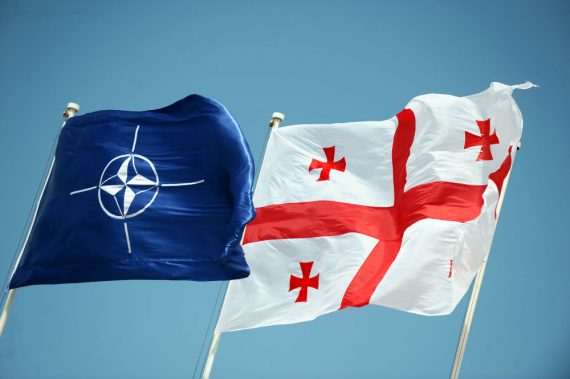

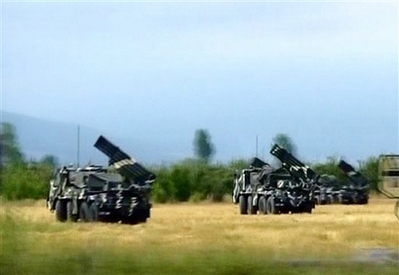

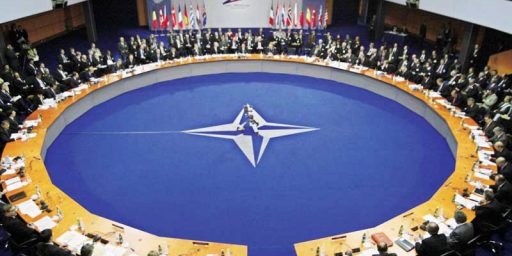
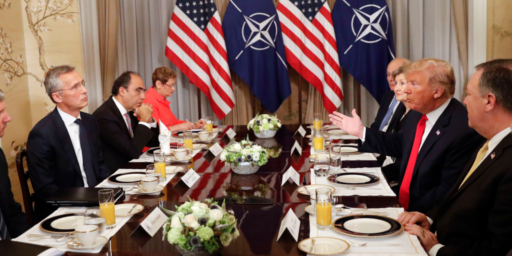
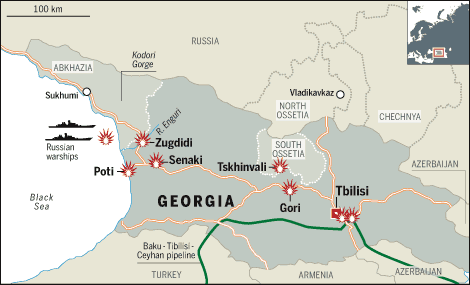
Engage MSNBC Full Russia Mode.
Repeating Russian Talking points, Comrade. You better register under the Foreign Agents Registration Act.
It’s an awful idea but it’s no worse than admitting Montenegro, Estonia, Lithuania, or Latvia which we’ve already done and not nearly as bad as admitting Ukraine which has been talked about.
@Dave Schuler:
“It’s an awful idea but it’s no worse than admitting Montenegro, Estonia, Lithuania, or Latvia which we’ve already done and not nearly as bad as admitting Ukraine which has been talked about.”
Except that all of the other countries have a land border with another NATO country. Georgia does not, so in a crisis requiring us to come to Georgia’s defense (as the NATO charter requires), we would have no way to bring large quantities of troops there, short of naval transport or plane, both of which would be subject to Russian attacks.
@Dave Schuler:
As I stated earlier this year, I agree about the admission of Montenegro. I am equally skeptical about proposals for admission involving nations such as Kosovo and Macedonia.
As for the Baltic states, at least one can say that these nations have territorial integrity with the rest of the alliance as well as historic ties to Europe. Additionally, I think it’s clear that one of the main reasons they were admitted was due to the circumstances of the absorption into the USSR, to begin with. Admittedly, that may or may not be a *good* reason, but it’s at least something.
In Georgia’s case, you don’t have the same thing. Yes, it shares a relatively short border with Turkey but that’s about it. It doesn’t really have historic ties to Europe and, indeed, most of its history it has been within the Russian sphere of influence. That, combined with the dormant but ongoing territorial conflict with Russia is reason enough to oppose membership.
@Moosebreath:
Georgia does share a short border with Turkey, but my understanding is that it is mostly mountainous terrain that would, as you said, make it difficult to quickly move forces into the area other than by naval or air transport. And placing even a small contingent of troops there on a permanent basis seems unwise to me.
The border between Georgia and Turkey is roughly 100 miles wide. The border between Poland and Lithuania is about 65 miles wide.
@Doug Mataconis:
I stand corrected.
That said, I suspect it far more likely that within the next decade Turkey leaves NATO due to disagreements with other NATO countries than Georgia joins it.
And where does our Secretary of State stand on this issue? Or is he too busy turning down money to counteract actual threats to pay attention to this too?
I keep wondering if I will get a single day during which I am not embarrassed by, or made to be angry with, this ship of fools.
@Dave Schuler:
Fair point, but the Baltic States also have fairly long borders with the Baltic Sea that make the movement of military assets easier. In any case, as I said, I’m aware of the arguments against the membership against the Baltic States. If we were discussing their membership today, perhaps I’d agree with some of those arguments. But now that they are members, we must deal with what that means for the alliance and Article V.
At the very least, though, the questions about their membership are part of the very reason we should be far more careful about the question of admitting nations like Ukraine and Georgia, especially when the territorial integrity of both nations remains in doubt.
@Moosebreath:
I’m not so sure about that, There are many benefits that Turkey derives from NATO membership, and even Erdogan has not suggested abandoning the alliance.
@Jen:
Since it came from the Vice-President I assume the statement about Georgian membership reflects Administration policy. It would be an extreme break with protocol for the VP to be suggesting something like this without approval.
@Doug Mataconis:
Agreed all around.
If that will help the Braves, fine. But they are a year or two away. They have some great minor league prospects.
@Tyrell:
LOL!
I’m not sure anything is going to help the Braves in the short-term.
@Doug Mataconis:
I’m not at all sure that’s a reasonable assumption.All things considered, it’s just as likely to have been an effort to influence policy. Or just blowing to please a crowd in Tbilisi for an hour. And even if it was administration policy yesterday, is that any reason to assume it is today?
That said, yes, NATO membership would be a commitment to go to war in impossible conditions to protect something of no value to us.
@Paul L.:
You do realize that the sovereignty of Georgia, Ukraine and S. Ossetia is, at this point, problematic. Why anyone would reflexively support Pence-Trump on this one is beyond me.
@Tyrell:..Yuck! Yuck! Yuck!
@gVOR08:
It’s a way for Trump to say, “look, I did something Putin doesn’t like.” It’s perfect because it’s never going to happen and everyone knows it. It has the appearance of being policy without being anything at all.
A NATO country in the Caucasus? Why not make Jordan a member if we’re that desperate for trouble? Welcome to NATO, Kashmir. We’d be sticking our heads in Russia’s mouth. Totally different situation in the Baltics militarily, they only go about 100 miles deep and the Baltic Sea is all ours. Kaliningrad would be Putin’s head in our mouth.
An ally should be able to bring something to the table in return for our commitment. A NATO country is under the umbrella of America’s armed forces. What is Georgia’s value that make it worth the blood of our troops? When the USSR ruled that region, no sane person would have advocated war to free it from Moscow. At this time is there any national interest in preventing Russia from retaking it?
@Tyrell:
I was thinking that it was to bolster the Falcons’ defense in a Superbowl rematch with the Patriots.
@Doug Mataconis:
The Bosporus, under Turkish control, is one of the greatest assets of NATO. Nothing is going to change here.
“Russia and Georgia fought a brief war in 2008, which lead to two breakaway Georgian regions, South Ossetia and Abkhazia, declaring independence. ”
The two regions had both declared independence much before that (South Ossetia declared its independence still in the times of USSR, I think).